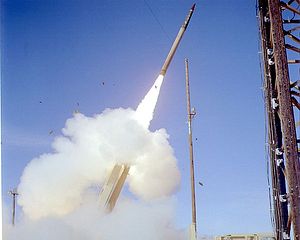Chinese President Xi Jinping, on Monday, conveyed China’s continued opposition to the deployment of an advanced U.S. missile defense system on the Korean peninsula at a bilateral meeting with South Korean President Park Geun-hye on the sidelines of the Hangzhou G20 meeting. China’s state-run Xinhua news agency quoted Xi as telling Park that “mishandling the issue is not conducive to strategic stability in the region and could intensify disputes.”
China has strongly protested a joint decision by the United States and South Korea earlier this summer to deploy the Terminal High Altitude Area Defense (THAAD) system in South Korea’s Seongju county amid rising ballistic missile threats from North Korea. Beijing fears that the advanced X-band radars accompanying the THAAD battery in Seongju could convey sensitive Chinese missile testing data to the United States, thereby threatening its security. China has, to date, rejected U.S. offers for technical talks on the nature of the THAAD system, which Washington believes would help alleviate Chinese concerns about the platform.
Park acknowledged Xi’s concerns on the deployment of THAAD in Hangzhou, but reiterated South Korea’s threat perception from North Korea. “This year, North Korea conducted a fourth nuclear test and a ballistic missile provocation, which has seriously undermined peace in this region and posed a challenge to the development of the South Korea-China relations,” she told Xi, according to South Korea’s Yonhap news agency.
“[I] hope that through earnest communication, our two countries can turn this challenge into an opportunity to further strengthen and move forward our bilateral relationship,” she added. Park’s words suggested an invitation to China to join South Korea and the United States in pressuring North Korea to abandon its nuclear and missile development. Beijing has historically been North Korea’s closest partner and benefactor and, despite signing on to unusually harsh United Nations Security Council sanctions earlier this year after Pyongyang’s fourth nuclear test, China has demonstrated reluctance in enforcing sanctions.
The decision to deploy THAAD has caused a sharp deterioration in the bilateral relationship between Seoul and Beijing, which showed signs of a sharp upward trajectory last fall. For example, Park was warmly welcomed as Beijing’s military parade to mark the 70th anniversary of the end of the Second World War in September 2015. The G20 bilateral meeting between Park and Xi appears to have been delicately handled by both leaders, with neither resorting to accusatory language over the THAAD issue as their foreign ministries have done in the past. Park’s framing of the North Korea issue as a direct challenge to ties between Seoul and Beijing suggests that South Korea expects China to change its tune on sanctions enforcement and support for Kim Jong-un’s regime.
However, it still remains how the differences over THAAD will play out between the two Northeast Asian neighbors. As others have discussed in The Diplomat, China has retaliated in part by threatening cultural and economic exchange between the two countries, raising concerns among South Korean businesses and investors that the THAAD issue could spill over into a major economic issue. To date, however, Beijing’s perceived economic retaliation has been limited.

































